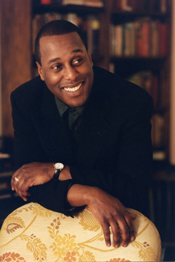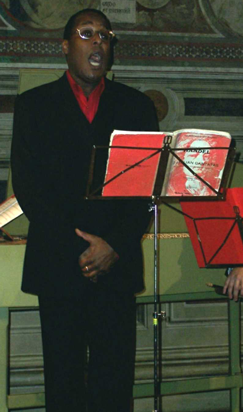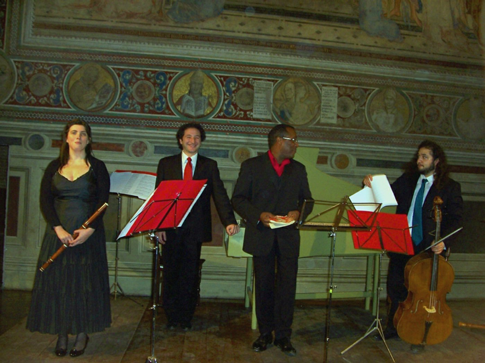
04 Dec 2007
Beyond The Media Avatar
Imagine a mild December night, with some three hundred people queueing for a concert ticket on Siena’s horseshoe-shaped Piazza del Campo.
English Touring Opera are delighted to announce a season of lyric monodramas to tour nationally from October to December. The season features music for solo singer and piano by Argento, Britten, Tippett and Shostakovich with a bold and inventive approach to making opera during social distancing.
This tenth of ten Live from London concerts was in fact a recorded live performance from California. It was no less enjoyable for that, and it was also uplifting to learn that this wasn’t in fact the ‘last’ LfL event that we will be able to enjoy, courtesy of VOCES8 and their fellow vocal ensembles (more below …).
Ever since Wigmore Hall announced their superb series of autumn concerts, all streamed live and available free of charge, I’d been looking forward to this song recital by Ian Bostridge and Imogen Cooper.
Although Stile Antico’s programme article for their Live from London recital introduced their selection from the many treasures of the English Renaissance in the context of the theological debates and upheavals of the Tudor and Elizabethan years, their performance was more evocative of private chamber music than of public liturgy.
Evidently, face masks don’t stifle appreciative “Bravo!”s. And, reducing audience numbers doesn’t lower the volume of such acclamations. For, the audience at Wigmore Hall gave soprano Elizabeth Llewellyn and pianist Simon Lepper a greatly deserved warm reception and hearty response following this lunchtime recital of late-Romantic song.
For this week’s Live from London vocal recital we moved from the home of VOCES8, St Anne and St Agnes in the City of London, to Kings Place, where The Sixteen - who have been associate artists at the venue for some time - presented a programme of music and words bound together by the theme of ‘reflection’.
'Such is your divine Disposation that both you excellently understand, and royally entertaine the Exercise of Musicke.’
‘And there was war in heaven: Michael and his angels fought against the dragon; and the dragon fought and his angels, And prevailed not; neither was their place found any more in heaven … that old serpent … Satan, which deceiveth the whole world: he was cast out into the earth, and his angels were cast out with him.’
There was never any doubt that the fifth of the twelve Met Stars Live in Concert broadcasts was going to be a palpably intense and vivid event, as well as a musically stunning and theatrically enervating experience.
‘Love’ was the theme for this Live from London performance by Apollo5. Given the complexity and diversity of that human emotion, and Apollo5’s reputation for versatility and diverse repertoire, ranging from Renaissance choral music to jazz, from contemporary classical works to popular song, it was no surprise that their programme spanned 500 years and several musical styles.
The Academy of St Martin in the Fields have titled their autumn series of eight concerts - which are taking place at 5pm and 7.30pm on two Saturdays each month at their home venue in Trafalgar Square, and being filmed for streaming the following Thursday - ‘re:connect’.
The London Symphony Orchestra opened their Autumn 2020 season with a homage to Oliver Knussen, who died at the age of 66 in July 2018. The programme traced a national musical lineage through the twentieth century, from Britten to Knussen, on to Mark-Anthony Turnage, and entwining the LSO and Rattle too.
With the Live from London digital vocal festival entering the second half of the series, the festival’s host, VOCES8, returned to their home at St Annes and St Agnes in the City of London to present a sequence of ‘Choral Dances’ - vocal music inspired by dance, embracing diverse genres from the Renaissance madrigal to swing jazz.
Just a few unison string wriggles from the opening of Mozart’s overture to Le nozze di Figaro are enough to make any opera-lover perch on the edge of their seat, in excited anticipation of the drama in music to come, so there could be no other curtain-raiser for this Gala Concert at the Royal Opera House, the latest instalment from ‘their House’ to ‘our houses’.
"Before the ending of the day, creator of all things, we pray that, with your accustomed mercy, you may watch over us."
The doors at The Metropolitan Opera will not open to live audiences until 2021 at the earliest, and the likelihood of normal operatic life resuming in cities around the world looks but a distant dream at present. But, while we may not be invited from our homes into the opera house for some time yet, with its free daily screenings of past productions and its pay-per-view Met Stars Live in Concert series, the Met continues to bring opera into our homes.
Music-making at this year’s Grange Festival Opera may have fallen silent in June and July, but the country house and extensive grounds of The Grange provided an ideal setting for a weekend of twelve specially conceived ‘promenade’ performances encompassing music and dance.
There’s a “slide of harmony” and “all the bones leave your body at that moment and you collapse to the floor, it’s so extraordinary.”
“Music for a while, shall all your cares beguile.”
The hum of bees rising from myriad scented blooms; gentle strains of birdsong; the cheerful chatter of picnickers beside a still lake; decorous thwacks of leather on willow; song and music floating through the warm evening air.

Imagine a mild December night, with some three hundred people queueing for a concert ticket on Siena’s horseshoe-shaped Piazza del Campo.
Past the stately gates of the medieval city hall, a breath-taking sight: the Sala del Mappamondo, a large hall studded with the old regalia of the proud Tuscan Republic that once competed with Florence over supremacy of Europe’s financial markets. Images of saints and sinners; angels, bankers, friars and warriors frescoed by Simone Martini, Duccio di Buoninsegna, Sano di Pietro — names echoing like clarions. And the clarions are actually there, arranged within crystal shelves: precious originals of the long trumpets whose copies still resound twice in a year for the Palio horse race. From Autumn 2008, this is planned to become one more regular series, a so-called “Festival Contemporaneamente Barocco” storming a variety of historic venues in the city — including two recently-restored opera houses, the cathedral, the university and more — with events connected to opera, music, drama and cultural heritage at large.
To Italian concertgoers who missed the seldom chance to hear him live, countertenor Derek Lee Ragin is a sort of media avatar, the lower half of Farinelli’s voice as heard in the gorgeous soundtrack of a (quite despicable) 1994 feature film on the legendary Neapolitan castrato. The upper one, as largely spread at that time, was provided by the Polish soprano Ewa Mallas Godlewska, with a French computer digitally processing both halves into the virtual reconstruction of a voice which, around 1725, could boast a range of two octaves and a fourth (from A to D’’’) — and later extended by a few more pitches downward, thus to around three octaves! (However, there is no surviving evidence in the scores that Farinelli ever used all of them in any single piece…).

As to Ragin, his voice sounds most effectively in the range just around the middle C up to a tenth above. It might have grown darker in years, yet without losing the appeal of an other-wordly color, something of an alto of warm polish and purity, all of a sudden opening up towards high notes generally forbidden to the male falsetto. At those dizzying pitches, he doesn’t either squeak or resort to a metallic compression that betrays strain, like many among his peers tend to, but emerges with a lustrous full-pressure resonance, apparently with some major support from the chest. If only he could smooth the transition between both ranges, you would call him a monster; nevertheless, he remains a singer of superior class and versatility, equally at ease in Baroque arias, contemporary music and the Negro spiritual. Add to that a technical refinement matching the stipulations of early Bel Canto style. His opening messa di voce in “Alto Giove”, from Porpora’s Polifemo, pierced the gloomy instrumental atmosphere like a sunbeam from a cloudy sky — a terrific effect. One more piece from Farinelli’s suitcase repertoire — “Ombra fedele anch’io”, set by the castrato’s profligate brother Riccardo Broschi in his opera Idaspe — was lamentably shortened of its second section and subsequent da capo. A pity indeed, considered Ragin’s heart-rending delivery of the first plaintive section, featuring a good deal of appoggiaturas and inter-registral leaps in slow tempo. Before that, a pair of Handel cantatas (Mi palpita il cor, HWV 132d and Lungi da me, HWV125b) displayed bravery in fast syllabic passages, meaningful switching between staccato and legato, polished fast trills, evidence of dramatic sensitivity in the recitatives. By the way, Ragin’s Italian diction was more than acceptable throughout, reaching a peak in the favorite encore “Ombra mai fu” from Xerxes, whose notorious text clumsiness often fires jokes among native hearers.

Besides providing a spirited accompaniment to Ragin’s vocal solos, the resident period band “Il Rossignolo” (a gentle archaism for nightingale) showed off with notable panache in the fillers: a four-parts sonata and a concerto for the same forces by Telemann, plus Vivaldi’s Concerto for recorder, RV 106. All of the players emerged in turns for their individual merits and deserve quotation: harpsichordist-cum-conductor Ottaviano Tenerani and flautist Marica Testi for their assured elegance of phrasing, the mercurial cellist Ludovico Minasi for his bold strokes, Luca Giardini, a young violinist in growing international demand, both for finery of sound and fanciful embellishments. Oboist Martino Noferi, a promising virtuoso on the baroque oboe, didn’t perform equally well on the recorder. He should probably choose for the better opportunity, sooner or later.
Carlo Vitali